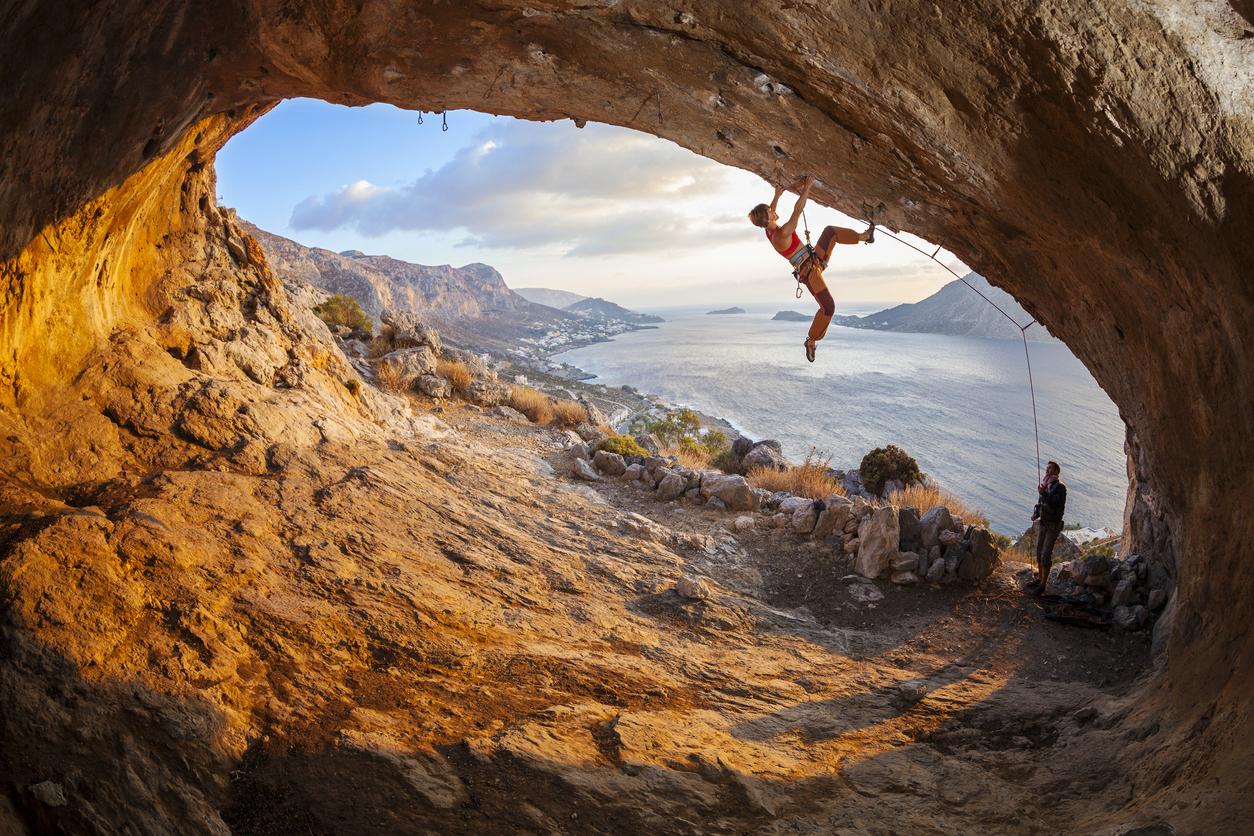When most of us think of sports, we think of individuals or teams duking it out in a competitive athletic event on the pitch, court, or field.
Usually, when we think of sports, activities such as tennis, football, rugby, and archery come to mind, but what exactly is a sport? How do we decide what counts as a sport and what doesn’t?
Particularly for activities such as rock climbing, it can be challenging to characterize the entire pursuit as a sport.
This is because “rock climbing” is not one particular activity, but rather, it is an umbrella term used to describe a plethora of different ways of ascending rock or, in some cases, plastic formations and features.
If you are not aware of the diversity of climbing disciplines, check out our article on the different types of rock climbing.
Thus, determining whether or not rock climbing is actually a sport is much more difficult than it might initially appear.
In fact, the question of whether or not rock climbing is a sport has plagued climbers for generations, especially when they talk about their climbing pursuits with non-climbing friends and relatives who are often just generally confused about what rock climbing is and why someone would ever choose to do it.
Thankfully, we’re here to help settle the question of whether or not rock climbing is a sport, once and for all.
To help give you fodder for your next family dinner or friendly debate between climbing partners, here’s our answer to, “Is rock climbing a sport?”
What is a sport?
Before we even dig into whether or not rock climbing is a sport, we first have to look at what a sport actually is. The venerable Oxford English Dictionary defines a sport as:
An activity involving physical exertion and skill in which an individual or team competes against another or others for entertainment.
Thus, if we work with this well-accepted definition of sport, any activity that is considered a sport must meet all of the following three criteria: It must involve physical exertion and skill It must be for the purpose of fun or entertainment It must involve some semblance of competition
This definition works well for the activities we commonly call “sports,” such as cricket, golf, and baseball.
Additionally, it also includes pursuits such as billiards, badminton, competitive cheerleading, and darts, which, although popular, don’t receive as much attention on the international sports broadcasting and media stage.
At the same time, however, this definition excludes activities such as poker, scrabble, and chess.
This is because these pursuits, while fun and competitive, do not involve physical exertion. Thus, a poker match cannot be considered a sporting event, but rather some other form of entertainment, like a game.
Moreover, when discussing whether or not a something is a sport, it is important to highlight the fact that a single pursuit can be both a sport and not a sport, depending on when and how it’s played.
For example, someone spending the afternoon shooting a basketball by themselves at the gym or town park, would not be playing a sport - they would just be exercising.
Add another player into the mix, however, for a small game of 1 on 1 basketball and then they would be playing a sport. This concept will be important to keep in mind as we delve deeper into whether or not rock climbing is a sport.
Does rock climbing fit the definition of a sport?
Now that we understand what a sport is, we can start to determine whether or not climbing is a sport.
To start our discussion, we should first look at whether or not climbing meets the three requirements of the definition of a sport:
A sport must involve physical exertion and skill
Anyone who tells you that rock climbing doesn’t involve physical exertion probably hasn’t ever used the power of their own muscles to pull themselves off the ground and up a steep cliff while holding onto minuscule edges with their fingers.
Physical exertion is central to all climbing disciplines, so rock climbing certainly satisfies this part of the requirement.
Moreover, skill is certainly a part of every kind of climbing.
While the average athletic person can pull and yank their way up an easy or moderate climb, only the most skilled climbers can ever hope to top out on more difficult routes.
Additionally, in some forms of climbing, namely traditional climbing and alpine climbing, skill and technique are often as important, if not more important, than physical strength.
This need for skill is clear if you ever get the chance to watch a new climber on a moderately difficult slab climb.
While an athletic person can often muscle their way up a near-vertical or vertical moderately-rated climb, they often struggle on slab climbs because they require more footwork, finesse, and impeccable technique than superhuman strength.
Therefore, both physical exertion and skill are required to be a successful climber.
A sport must be for the purpose of fun or entertainment
If you climb, you almost certainly do it for fun or for entertainment. Especially when it comes to sport climbing, bouldering, gym climbing, and single-pitch cragging, the emphasis for most climbers is on having a good time and enjoying a day of climbing.
While some people might argue that the risk and danger of climbing can detract from the fun of it all, such arguments are somewhat narrow-minded and fail to realize that many popular sports, such as rugby and boxing pose extremely high risks to participants - some of which we are only now starting to recognize with the current emphasis on understanding and treating the long term effects of concussion-related injuries.
Additionally, although the vast majority of climbers will be scared at some point during their climbing careers, for many, overcoming this fear and working through it is just part of the journey.
Thus, even though climbing is inherently dangerous, risky, and sometimes scary, when done recreationally, it is almost always done for the fun and entertainment of the climbers themselves. Therefore, rock climbing satisfies this part of the criteria for consideration as a sport.
A sport must involve some semblance of competition
This is the tricky part of determining whether or not rock climbing is a sport.
While some people climb for competition, most others do not. Someone who is competing in an organized climbing competition is certainly taking part in a sporting event, but someone who is just going to the Gunks for a day of cragging probably isn’t.
This distinction is similar, in many ways to the difference between shooting a basketball alone for fun and playing a small game of 1 on 1. While the game of 1 on 1 can be considered a sport, the simple act of shooting a basketball doesn’t involve any competition, so it’s not a sport, but an activity.
The same is true of climbing. When done for a competition, any discipline of climbing, whether sport, bouldering, mixed, or something else entirely, can be considered a sporting event.
But when done simply for personal pleasure, climbing doesn’t quite meet the requirements for being a sport.
That being said, there are some times when it can be difficult to classify a particular climbing pursuit as an activity or a sport.
For example, if two climbing parties are informally racing each other to make the first ascent of a peak or if two top sport climbers are both working a new, really difficult route, there is some competition involved in the pursuit.
But is it enough for it to be considered a sport?
If we follow along with the Oxford English Dictionary’s definition of a sport, which is, admittedly, somewhat vague, it seems as though such informal competition would be enough to classify an athletic pursuit that’s done for pleasure, such as climbing, as a sport.
Thus, if we can consider two climbing parties trying to beat each other to a fastest known time or to the top of an unclimbed mountain to be engaging in competition, then we are ultimately left with a fairly fluid understanding of climbing as a sporting event.
The Verdict
All of this, of course, might seem a bit problematic to someone who’s looking for a clear, single answer as to whether or not rock climbing is a sport.
Unfortunately, with a pursuit such as rock climbing, which is constantly changing and evolving, such definitive answers are hard to come by.
Additionally, since there is no single rock climbing “governing body” or set of “rules” for climbing, we are unlikely to arrive at a definitive answer for this question any time soon.
However, with rock climbing’s recent inclusion in the 2020 Olympic Games, we will likely see many more people characterizing the entire pursuit as a sport, despite the fact that only certain kinds of climbing actually fit the definition of a sport.
Ultimately, whether or not we can consider rock climbing to be a sport really depends on the discipline of climbing you’re talking about.
Although some forms of climbing will be easier to classify as a sport, others are more nebulous in their definition and scope, so we may never really be able to determine whether or not they meet the requirements for sport hood.
So, is rock climbing a sport?
Well, as with all great questions, the answer to this one is: it depends.



